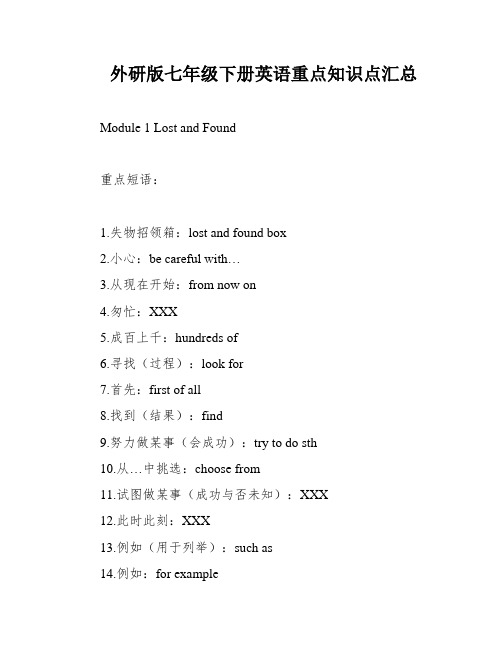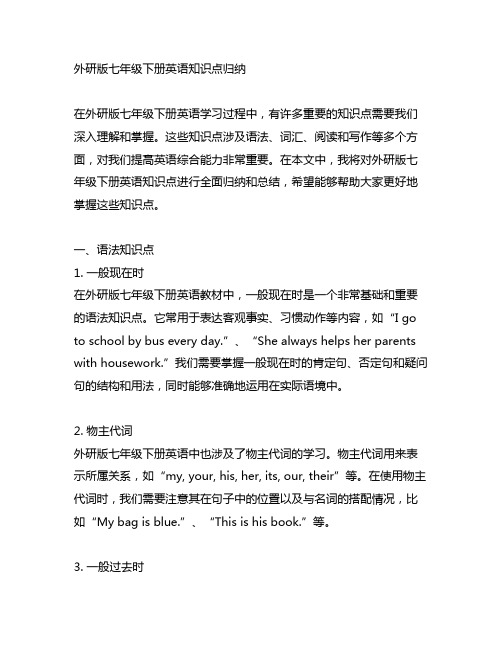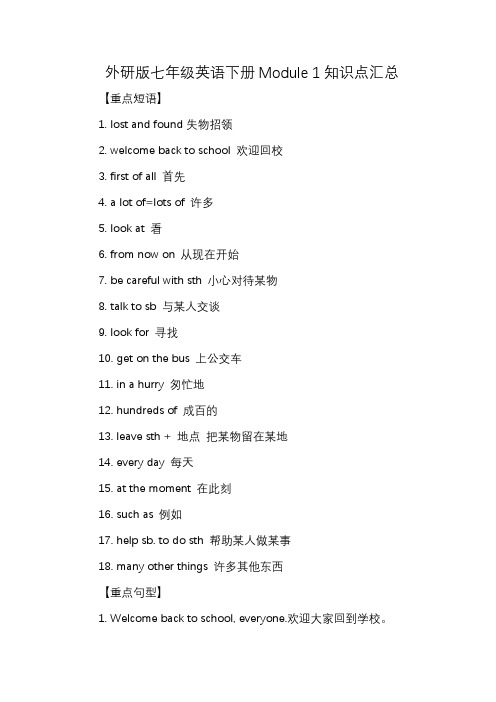新外研版七年级下册知识点整理1
外研版七年级下册英语重点知识点汇总

外研版七年级下册英语重点知识点汇总Module 1 Lost and Found重点短语:1.失物招领箱:lost and found box2.小心:be careful with…3.从现在开始:from now on4.匆忙:XXX5.成百上千:hundreds of6.寻找(过程):look for7.首先:first of all8.找到(结果):find9.努力做某事(会成功):try to do sth10.从…中挑选:choose from11.试图做某事(成功与否未知):XXX12.此时此刻:XXX13.例如(用于列举):such as14.例如:for example重点句型:1.这是谁的 (XXX)2.帮助某人做某事:help sb do XXX.3.请小心保管…:XXX…4.欢迎来到…:e to +地点5.给某人打call sb at +电话号码语法总结:物主代词:表示所属关系的代词(…属于谁的)单数:人称形容词性物主代词名词性物主代词第一人称 my XXX第二人称 your yours第三人称 his hers its复数形容词性物主代名词性物主代第一人称 our ours第二人称 your yours第三人称 their theirs形容词性物主代词:必须和名词在一起,例如XXX,your XXX…名词性物主代词:相当于与之相对应的形容词性物主代词+名词,例如XXX.Module 2 What Can You Do?重点短语:1.与某人相处融洽:get on well with sb.2.弹钢琴:play the piano3.打乒乓球:play table XXX4.…怎么样?=how about…。
what about…5.担心…:XXX…6.擅长做某事:be good at doing sth.7.放风筝:fly a kite重点句型:无语法总结:无2.high-tech高科技的3.XXX虚拟现实4.XXX机器人仆人5.XXX太空旅行6.XXX可再生能源7.self-driving cars自动驾驶汽车8.ic engineering基因工程9.XXX寿命10.artificial intelligence人工智能重点句型】1.In the future。
外研版英语七年级下册知识点(通用8篇)

外研版英语七年级下册知识点(通用8篇)外研版英语七年级下册知识点(1)一、单词辨析wear, in 与putwear 动词,穿着,戴着。
强调穿的状态。
in 介词,后接衣服或颜色的词。
着重衣服的款式或颜色。
put on 动词,穿上,戴上,强调穿的动作,后接衣服,鞋帽。
spend 花费,度过①+ spend +时间/金钱+ on 人在上花费时间/金钱eg:I spend much time on②+ spend +时间/金钱+ ( in) doing 花费时间金钱做某事eg: I spend much time watching③+spend +时间+ with + 和某人一起度过。
eg: I spend my weekend with my二、短语forward to + / 期待某事/期待做某事eg:We are looking forward to visiting Hong 我们都很期待去香港玩。
I am looking forward to your 我很期待你的到来。
go sightseeing = do some sightseeing观光游览类似结构:go shopping 购物 go cooking 做饭go washing 洗衣服 go cleaning 打扫卫生a picnic 去野餐英语中经常用have或take, make等动词+ 组成词组。
eg:have a good time 玩得高兴 have a rest 休息一会take a walk 散步 make a presentation 做一个介绍oneself 过的愉快相当于have a good time, 在口语中,用作祈使句。
eg:I’m going to enjoy myself during the May Day 我打算在五一假期好好玩一玩。
I hope you enjoy yourself this 我希望你今晚过的愉快。
外研版七年级下册英语知识点

外研版七年级下册英语知识点一、动词的时态英语动词根据时间的不同,可以分为一般现在时、一般过去时和一般将来时。
1. 一般现在时:表示经常性的动作、习惯、真理、客观事实等。
例句:I often go to the park on weekends.She speaks English very well.2. 一般过去时:表示过去某个时间发生的动作或状态。
例句:He watched a movie last night.They lived in London two years ago.3. 一般将来时:表示将来要发生的动作或存在的状态。
例句:We will visit our grandparents next week.She is going to travel to France next month.二、名词的数英语中,名词的数有单数和复数两种形式。
1. 单数名词:表示一个人或事物。
例句:There is a cat in the garden.He is my friend.2. 复数名词:表示多个人或事物。
例句:There are many books on the shelf.They are my friends.三、形容词的比较级和最高级形容词的比较级和最高级可以用来比较两个或多个人或事物的程度。
1. 比较级:用于比较两个人或事物。
例句:She is taller than her sister.This book is more interesting than that one.2. 最高级:用于比较三个或三个以上的人或事物。
例句:He is the tallest boy in the class.This is the most expensive car in the showroom.四、情态动词情态动词可以用来表示说话人的态度、意愿、推测、可能性和应该性等。
1. can:表示能力和许可。
(完整版)外研版七年级英语下册知识点归纳及练习

MODULE1一、词汇。
1. listen 听(强调动作)hear 听见(强调结果)I listened carefully but I heard nothing. 我仔细听但什么也没听到2.on a (school) trip3. have a good time = enjoy oneself4. take pictures = take photos5. lie in the sun躺在阳光下lie on the beach 躺在沙滩上躺下【动】She is lying on her back. 她正仰卧着。
位于【动】London lies on the River Thames 伦敦位于泰晤士河畔说谎【动】You are lying to him! 你在对他说谎。
eg: Look! The boy ________on the bed and reading a book.A. is lyingB. lyingC. liesD. lie6. send sb. a postcard 寄给某人一张明信片send sth. to sb. = send sb. sth.7. anyway 无论如何(转移话题)8. buy some presents 买礼物buy sth. for sb. = buy sb. sth.9. enjoy sth. 喜欢某物enjoy oneself = have a good/ great time 玩的开心enjoy/ like doing sth. 喜欢做某事10. at this moment=now 此时此刻(现在进行时)11. leave work 下班be at work 上班He is at work. = He is working12. wait for buses 等公共汽车run for trains 赶乘火车(地铁)13. have afternoon tea 喝下午茶14. watch a ballet 看芭蕾see friends 看望朋友get dressed = dress oneself 穿衣;打扮eg: The boy can’t dress himself.15. call home 给家里打电话call sb. = give sb. a call= phone sb.二、语法。
外研版七年级下册英语知识点归纳

外研版七年级下册英语知识点归纳在外研版七年级下册英语学习过程中,有许多重要的知识点需要我们深入理解和掌握。
这些知识点涉及语法、词汇、阅读和写作等多个方面,对我们提高英语综合能力非常重要。
在本文中,我将对外研版七年级下册英语知识点进行全面归纳和总结,希望能够帮助大家更好地掌握这些知识点。
一、语法知识点1. 一般现在时在外研版七年级下册英语教材中,一般现在时是一个非常基础和重要的语法知识点。
它常用于表达客观事实、习惯动作等内容,如“I go to school by bus every day.”、“She always helps her parents with housework.”我们需要掌握一般现在时的肯定句、否定句和疑问句的结构和用法,同时能够准确地运用在实际语境中。
2. 物主代词外研版七年级下册英语中也涉及了物主代词的学习。
物主代词用来表示所属关系,如“my, your, his, her, its, our, their”等。
在使用物主代词时,我们需要注意其在句子中的位置以及与名词的搭配情况,比如“My bag is blue.”、“This is his book.”等。
3. 一般过去时另外,一般过去时也是外研版七年级下册英语中一个重要的语法知识点。
一般过去时用来表示过去发生的动作或状态,常常与表示过去的时间状语连用,如“last week, yesterday”等。
我们需要掌握一般过去时的构成和用法,能够正确地运用在句子中。
二、词汇知识点1. 数词外研版七年级下册英语中还包括了数词的学习。
数词用来表示数量,有基数词和序数词之分,如“one, two, three, first, second, third”等。
在学习数词时,我们需要注意其在句子中的位置和用法,同时能够正确地读写和运用。
2. 表示时间的词汇除了数词,还有一些表示时间的词汇也是我们需要掌握的,比如“week, month, year, hour, minute, second”等。
七年级下册外研社知识点

七年级下册外研社知识点七年级下册外研社教材是初中英语教材中的一部分,主要包括语法、阅读、写作、听力和口语等多个方面的知识点。
下面将分别介绍这些知识点的相关内容。
一、语法知识点1.单数第三人称单数第三人称指的是以“he/she/it”作为主语的时候,动词的变化形式。
一般情况下,动词在单数第三人称时需要加上“-s”或者“-es”。
例如:He reads books every day. She brushes her teeth twice a day.2.一般现在时一般现在时是指描述现在正在进行或者习惯性发生的事情。
在描述动作的时候,要注意主语、谓语以及时间等元素的搭配。
例如:I usually get up at 6:30 in the morning. He often goes to the park with his friends.3.名词的复数形式一般情况下,名词的复数形式在末尾加上“-s”或者“-es”。
但是,也有一些特殊的名词需要按照不同规则进行复数变化。
例如:child—children, foot—feet, tooth—teeth等。
二、阅读知识点1.推理判断阅读理解中的推理判断是指通过文章中的信息以及自己的知识和常识来进行推断和判断。
在进行推测的时候,要根据文章的细节和线索来确定答案。
例如:根据文章中的描述和“most people think”这个词组,可以推测出某个问题的答案。
2.对话理解对话理解是指通过对文章中对话的理解来回答问题。
在进行对话理解的时候,要注意对话中人物的身份、关系以及他们所表达的含义和态度等信息。
例如:根据一段对话中的表述,可以推断出讲话者想要表达的意思。
三、写作知识点1.书信格式书信格式包括信头、称呼、正文、结尾和署名等几个要素。
在书写书信的时候,要根据信件的类型来选择不同的格式,包括正式和非正式等。
例如:正式信件需要使用较为规范的格式,而非正式信件可以根据自己的口味进行自由发挥。
外研版七年级英语下册Module 1知识点汇总

外研版七年级英语下册Module 1知识点汇总【重点短语】1. lost and found 失物招领2. welcome back to school 欢迎回校3. first of all 首先4. a lot of=lots of 许多5. look at 看6. from now on 从现在开始7. be careful with sth 小心对待某物8. talk to sb 与某人交谈9. look for 寻找10. get on the bus 上公交车11. in a hurry 匆忙地12. hundreds of 成百的13. leave sth + 地点把某物留在某地14. every day 每天15. at the moment 在此刻16. such as 例如17. help sb. to do sth 帮助某人做某事18. many other things 许多其他东西【重点句型】1. Welcome back to school, everyone.欢迎大家回到学校。
2. Please be careful with your things from now on.从现在开始请仔细看管你的东西。
3.Whose gloves are they?它们是谁的手套?4. People often lose things when they’re traveling or when they’re in a hurry. They leave things on planes, on trains, on buses and in taxis. 人们旅行或匆忙时经常丢东西。
他们把东西落在飞机上、火车上、公交车上或出租车里。
5. That’s why there are lost and found office at airports and stations. 那就是为何在飞机场和车站设有失物招领处的原因。
外研版七年级下英语知识点总结

Unit1 Can you play the guitar?1.常见的情态动词:cancouldmaymightmust shall shouldwillwould等情态动词+动词原形,疑问句中情态动词提前,否定句在情态动词后加not。
2.Play+ the+乐器play the guitar. play the drums. play the piano. play the violin Play +球类.棋类.牌类游戏play volleyball. play chess.play cards.Play(games)with sb. 和某人一起玩(游戏)3.Join+组织或者人Join the art club join sb. Join in+竞赛.娱乐.游戏等Take part in+活动加入到某活动中Be in 参加.加入.穿着4. what club do you want to join?你想要参加什么俱乐部?The singing club唱歌俱乐部the drawing club 绘画俱乐部the dancing club舞蹈俱乐部the swimming club游泳俱乐部the story telling club 讲故事俱乐部The music /English /art/chess/sports club 音乐/英语/美术/象棋/运动俱乐部5. Pianist钢琴家violinist小提琴手singer歌手dancer舞蹈家musician音乐家6.Let sb do sth 让某人做某事Let’s+动词原形让我们做某事7.Say+内容say hello to sb. say sorry to sb. say to sb.Speak+语言speak English/Chinese/Japanese speak to sb.Talk 谈论talk about sth. talk with sb. talk to sb. talk show脱口秀Tell 告诉.讲述tell sb. sth= tell sth to sb.告诉某人某事tell sb. about sth 告诉某人关于某事tell sb. to do sth. 告诉某人去做某事tell sb. not to do sth 告诉某人不要去做某事tell stories/ jokes/lies讲故事/讲笑话/说谎Ask问.要求ask for 请求ask sb for sth 向某人索要某物ask about询问关于某事ask sb. about sth询问某人关于某事ask sb to do sth 要求某人去做某事ask sb not to do sth要求某人不要去做某事8.Want to do sth.= would like to do sth.=feel like doing sth.想要做某事Want sb. to do sth.= would like sb. to do sth.想要某人做某事Want to be+adj want to be + 职业9.What about =how about,后接名词,代词,动名词what about you你呢?what about the book这本书怎么样?what about dancing跳舞怎么样?10.也:too 肯定句末(前面加逗号)Either否定句末(前面加逗号)Also 实前助后As well 口语中(前面不加逗号)11.be good at+ sth/doing sth=do well in 擅长于…be good for 对…有益(be bad for对…有害)be good to 对…友好(good 可用friendly.nice.kind替换)be good with和…相处好=get on well with= get along well with12.感官动词(look. sound. taste. smell. feel)+ adj做表语13.选择疑问句用or来连接选择部分.回答不用Yes或No.要从中选择一个回答14.students wanted for school show(wanted表示招募.含有被动意义)15.show sth to sb=show sb sth让某人看某物the school show 学校演出give sth to sb=give sb sth给某人某物16.help sb do sth Help sb with sth helpful有帮助的With one’s help= with the help of sb在某人的帮助下Help oneself to 随便享用can't help doing sth.情不自禁做某事17.be busy doing sth忙于做某事be busy with sth忙于某事18.need to do sth need sb to do sth need….for…19.be free to do sth= have time to do sth有时间去做某事Have no time= don’t have time=be busy 没有时间20.make friends with sb 和某人交朋友make money 赚钱make a living 谋生make faces做鬼脸make fun of sb取笑某人21.call sb. at +电话号码call sb. back 给某人回电话22.on the weekend= on weekends23. English-speaking students说英语的学生(English-speaking有连词符,是形容词)24.do kung fu练功夫The old people’s home老人之家the Students’Sports Center25.It is +adj +for sb to do sth做某事对于某人是...形容词修饰名词.副词修饰动词或者形容词26.teach sb sth教某人…. Teach me Chinese teach him MathTeach sb to do sth 教某人去做某事Learn to do sth 学习做某事learn from sb./sth向某人学习、从某事中学习27. Write down写下write to sb =write a letter to sb.给某人写信write back to sb 给某人回信hear from sb 收到某人的来信At least至少make a poster制作海报28.定冠词the的用法(1)特指某(些)人或某(些)物,这是定冠词的基本用法。
- 1、下载文档前请自行甄别文档内容的完整性,平台不提供额外的编辑、内容补充、找答案等附加服务。
- 2、"仅部分预览"的文档,不可在线预览部分如存在完整性等问题,可反馈申请退款(可完整预览的文档不适用该条件!)。
- 3、如文档侵犯您的权益,请联系客服反馈,我们会尽快为您处理(人工客服工作时间:9:00-18:30)。
外研版七年级下册知识点整理Module 1 Lost and foundUnit 1 Whose bag is this?一、重点句子1.Welcome back to school.2. Please be careful with…from now on.3. Here is/are…4. There are a lot of things in it.二、重点短语和句型1. first of all2. Whose …is this?3. It’s mine.4. Is this…yours5. Are these…yours?6. lost and found box三、常见考点1. 掌握物主代词的用法2. look for, find 的用法3. lose, lost, find, found的用法Unit 2 Are they yours?一、重点句子1. They leave things on planes, on trains, on buses and in taxis.2. That’s why there are lost and found offices at airports and stations.3. Hundreds of people come here every day.4. At the moment, there are also some strange things at the New York City Lost and Found Office.二、重点短语和句型1. They are looking for…2. Whose are they?3. in a hurry4. fifteen kilos of sausages5. talk to sb6. get on the bus三、常见考点1. two hundred,hundreds of2. leave, forget四、本模块语法1. 名词性物主代词的用法2. 形容词性物主代词的用法3. 人称代词的用法Module 2 What can you do?Unit 1 I can play the piano.一、重点句子1. What about you?2. That’s all.3. Don’t worry about…4. Choose your favourite club.二、重点短语和句型1. Can you…?2. Yes, I can. / No, I can’t.3. Which club can…?4. I can’t…5. on the board6. ride a bike7. speak Chinese8. like cooking三、常见考点(不用解析)1. play table tennis和play the piano的用法2. teach sb sth宾格的用法3. can 的用法4. would like to doUnit 2 I can run really fast. 一、重点句子1. I get on well with everyone, classmates and teachers.2. I’m always ready to help others.3. I do well at school.4. I’m sure everybody would like a clean classroom, just like home.二、重点短语和句型1. I’ like to be …2. I want to be…3. class/ PE/ cleaning monitor4. promise to do5. run fast6. be good at7. get the best score8. just like9. do cleaning三、常见考点1. be good at, do well in2. help sb do/to do/with sth3. get on well with4. make our classroom beautiful,make的用法四、本模块语法1. can 的用法Module 3 (有具体内容)Unit 1 (有具体内容)一、重点句子2. On Saturday morning, I’m going to check my email and do my homework.在周六上午,我打算查收一下我的电子邮件并做作业。
2. Who else is going to be there? 还有谁去?3. I’m going to stay at home alone. 我打算一个人在家呆着。
4. Don’t be silly! 别傻了!5. Would you like to join us? 你愿意加入我们吗?二、重点短语和句型1. go over lessons 复习功课2. help with the housework 帮忙做家务3. have a picnic 野餐4. at the weekend 在周末5. Would you like to do…? 你愿意做……吗?6. have a piano lesson 上钢琴课三、常见考点(不用解析)1. be going to do 的用法2. on Sunday morning/afternoon/eveningUnit 2 (有具体内容)一、重点句子1.I’m looking forward to the football match tomorrow.我期待着明天的足球比赛。
3. We are going to cheer the players. 我们打算为运动员们喝彩。
4.I’m going to enjoy myself during the May Day holiday. 我打算要在五一节期间玩得很愉快。
5. In the afternoon I’m going out with my family and friends. 在下午我和家人和朋友一起外出。
5. We are going sightseeing and going to have a picnic on the beach. 我们打算去观光游览并在沙滩上野餐。
二、重点短语和句型1. look forward to doing 盼望做某事2. cheer the players 为运动员喝彩3. spend time with family and friends 和家人和朋友一起度过时光4. go on a summer camp 参加夏令营5. sb+spend+时间/金钱+on sthsb+spend+时间/金钱+(in) doing sth三、常见考点1. spend的用法2.look forward to doing四、本模块语法一般将来时be going to doModule 4 (有具体内容)Unit 1 (有具体内容)一、重点句子1. Will schools be different in the future? 将来的学校会有所不同吗?2. In twenty years’ time, may be there won’t be any schools. 20年之后,或许就没有学校了。
3. Computers won’t be able to do that. 电脑却不能做那些。
4. Will students have a lot of homework to do? 学生将会有很多家庭作业要做吗?5. Will students need to go to school any more? 学生还将再需要去上学吗?二、重点短语和句型1. in the future 在将来2. be able to do 能够做…..3. not…..any more 不再4. a lot of free time 很多空闲时间5. get information on the Internet 在网上获得信息6. make friends 交朋友三、常见考点1. will+do2. be able to doUnit 2一、重点句子1. What will life be like in the future? 将来的生活会是什么样子的?2. In the future, a change of weather won’t mean a change of clothes. 在未来,天气的变化并不意味着衣服要更换。
3. We will wear a new kind of clothes. 我们将穿一种新型的衣服。
4. There will be no more light rain and cold wind in spring. 春天将不会再有细雨和寒风。
二、重点短语和句型1. come true 实现2. not only ….. but also 不但….而且…3. as well 也,还有三、常见考点1. not only ….. but also 不但….而且…四、本模块语法一般将来时willMODULE 7 My Past Life1. primary school 小学2. the name of ………的名字3. be born 出生于4. in England 在英格兰5. in Shanxi Province 在山西省6. quite difficult 非常难管7. on the east coast of America 在美国东海岸8. twelve years ago 12年前9. lots of things to do 许多事情要做10. last year 去年11. last weekend 上周末12. from…to…从…到…重点句子1. Where were you born? 你在哪里出生?2 I was born in…我出生在……3 What was the name of the village? 那个村庄叫什么?4 What was the name of your first school?你上的第一所学校叫什么名字?5 Who was your first teacher? 你的第一位老师是谁?6 She was very friendly. 她非常友好。
7 Who were your first friends? 你最早的朋友是谁呢?8 He was quite difficult. 他很难管。
